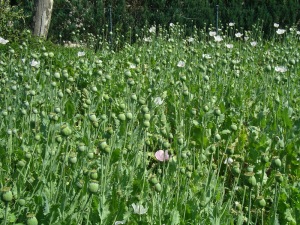The opium poppy is cultivated in different parts of the world such as Tasmania, India, Pakistan, Slovakia, France, Spain, Yugoslavia and Italy. The fruits of the poppy are rounded capsules. The liquid (milky latex) obtained after lancing the capsules contains opiates which are dried to produce raw opium, used for processing medicinal drugs such as codeine and morphine. The commercial production of opium poppies is adversely affected by uncontrolled weeds, insects and disease organisms. Commercial growers rely on pesticide applications as described in a recent article about poppy growing in Slovakia.
“The cropping system of poppy has seen important changes in recent years. In the past, growing this crop required a great deal of manual labor connected with singling, hoeing and particularly capsule collecting. At present, all operations of the large scale cropping system, from sowing to harvest, are fully mechanized. Registered pesticides are used to control weeds, diseases and pests.
Pre-emergent herbicides Callisto 480 SC (mesotrione), or Lentipur 500 FW + Command 36 CS (chlortoluron + clomazone) are applied within 3 days after sowing. Due to slow initial growth, the post-emergent application of herbicide in growth phase of 4-6 true leaves is usually necessary.
Protection against poppy root weevil is realized through seed treatment with Cruiser OSR preparation. …A dangerous pest of poppy is poppy weevil, against which the protection is aimed at the time of “hook stage”. Among the registered insecticides, Mospilan 20 SP (acetamiprid) and Nurelle D (chlorpyrifos + cypermethrin) are used.
Poppy downy mildew and poppy fire are considered to be the most dangerous diseases of poppy, in conditions of the Slovak Republic. Occurrence of downy mildew during the leaf rosette period is suppressed by seed treatment. …In the phase of stem elongation, application of Acrobat MZ WG (dimethomorph +mancozeb) is possible. In the “hook stage”, Discus (kresoxym-methyl) or Bumper Super (prochloraz + propiconazole) are used to suppress poppy fire on both leaves and capsules.”
Names: Fejer, J., and I. Salamon.
Affiliation: Presov University in Presov.
Title: Agro-Technology of the Poppy: Large-Scale Cultivation in Slovakia.
Source: Acta Hort. 2014. 1036:181-186.

